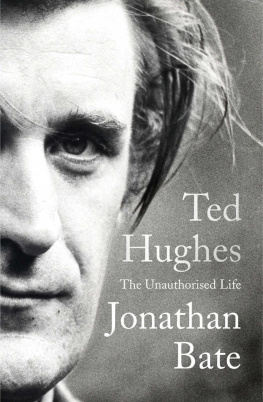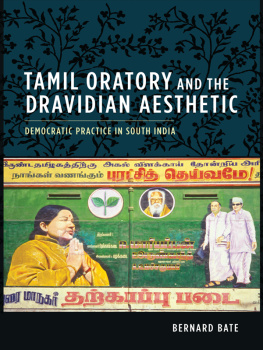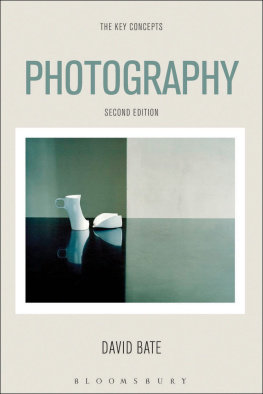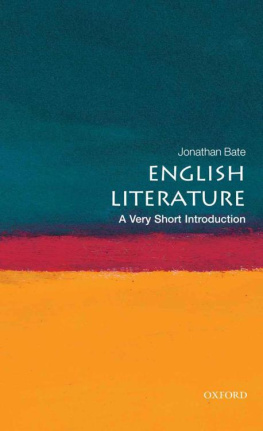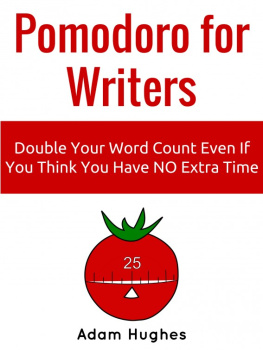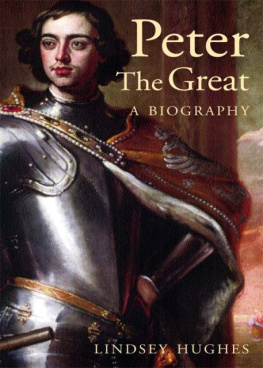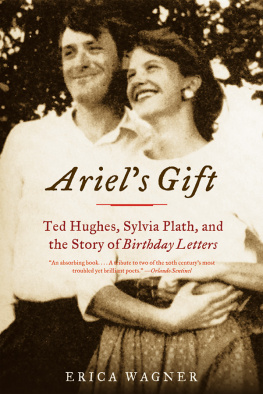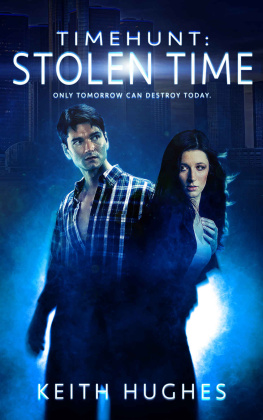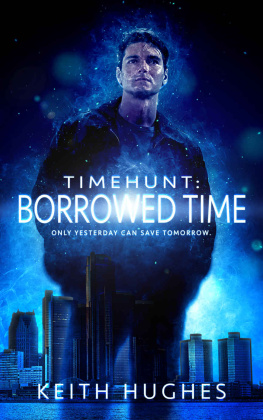Bate - Ted Hughes: The Unauthorised Life
Here you can read online Bate - Ted Hughes: The Unauthorised Life full text of the book (entire story) in english for free. Download pdf and epub, get meaning, cover and reviews about this ebook. year: 2015, publisher: HarperCollins Publishers, genre: Detective and thriller. Description of the work, (preface) as well as reviews are available. Best literature library LitArk.com created for fans of good reading and offers a wide selection of genres:
Romance novel
Science fiction
Adventure
Detective
Science
History
Home and family
Prose
Art
Politics
Computer
Non-fiction
Religion
Business
Children
Humor
Choose a favorite category and find really read worthwhile books. Enjoy immersion in the world of imagination, feel the emotions of the characters or learn something new for yourself, make an fascinating discovery.
- Book:Ted Hughes: The Unauthorised Life
- Author:
- Publisher:HarperCollins Publishers
- Genre:
- Year:2015
- Rating:4 / 5
- Favourites:Add to favourites
- Your mark:
- 80
- 1
- 2
- 3
- 4
- 5
Ted Hughes: The Unauthorised Life: summary, description and annotation
We offer to read an annotation, description, summary or preface (depends on what the author of the book "Ted Hughes: The Unauthorised Life" wrote himself). If you haven't found the necessary information about the book — write in the comments, we will try to find it.
Bate: author's other books
Who wrote Ted Hughes: The Unauthorised Life? Find out the surname, the name of the author of the book and a list of all author's works by series.
Ted Hughes: The Unauthorised Life — read online for free the complete book (whole text) full work
Below is the text of the book, divided by pages. System saving the place of the last page read, allows you to conveniently read the book "Ted Hughes: The Unauthorised Life" online for free, without having to search again every time where you left off. Put a bookmark, and you can go to the page where you finished reading at any time.
Font size:
Interval:
Bookmark:
William Collins
An imprint of HarperCollins Publishers
1 London Bridge Street
London SE1 9GF
www.WilliamCollinsBooks.com
First published in Great Britain by William Collins in 2015
Copyright Jonathan Bate 2015
Jonathan Bate asserts his moral right to
be identified as the author of this work
A catalogue record for this book is
available from the British Library
Cover image The British Library Board
The author and publishers are committed to respecting the intellectual property rights of others and have made all reasonable efforts to trace the copyright owners of the images reproduced, and to provide appropriate acknowledgement within this book. In the event that any untraceable copyright owners come forward after the publication of this book, the author and publishers will use all reasonable endeavours to rectify the position accordingly.
All rights reserved under International and Pan-American Copyright Conventions. By payment of the required fees, you have been granted the non-exclusive, non-transferable right to access and read the text of this e-book on screen. No part of this text may be reproduced, transmitted, down-loaded, decompiled, reverse engineered, or stored in or introduced into any information storage and retrieval system, in any form or by any means, whether electronic or mechanical, now known or hereinafter invented, without the express written permission of HarperCollins.
Source ISBN: 9780008118228
Ebook Edition October 2015 ISBN: 9780008118235
Version: 2015-09-02
For Paula Jayne, again and always
And for Barrie and Deedee Wigmore,
because the shepherds hut unlocked it
As an imaginative writer, my only capital is my own life
Ted Hughes (1992)
When you sit with your pen, every year of your life is right there, wired into the communication between your brain and your writing hand Maybe all poetry, insofar as it moves us and connects with us, is a revealing of something that the writer doesnt actually want to say but desperately needs to communicate, to be delivered of. Perhaps its the need to keep it hidden that makes it poetic makes it poetry. The writer darent actually put it into words, so it leaks out obliquely, smuggled through analogies were actually saying something we desperately need to share. The real mystery is this strange need. Why cant we just hide it and shut up? Why do we have to blab? Why do human beings need to confess? Maybe if you dont have that secret confession, you dont have a poem dont even have a story.
Ted Hughes, interviewed for The Paris Review (Spring 1995)
Q. Would you state your full name for the record?
A. Edward James Hughes.
Q. What is your residence address?
A. Court Green, North Tawton 11, England.
Q. Have you a business address?
A. Thats it. I work from home.
Q. And what is your occupation, sir?
A. Writer.
The Yorkshire accent is unfamiliar. Eleven is the stenographers mishearing of Devon. The date is 26 March 1986.
Q. And could you state your age for the record?
A. 55. I shall be 56 this year.
Q. Now, sir, were you at some time in your life married to a woman named Sylvia Plath?
A. Yes.
Q. Can you tell me when you first met her?
A. The 25th of February 1956.
Q. And where did you meet her?
A. Cambridge, England.
Q. And what were the circumstances of that meeting?
A. I met her at a party.
Q. Do you know what she was doing in England?
A. She was on a Fulbright scholarship.
Q. Do you know where she was from?
A. Did I know then?
Q. Yes.
A. I just knew she was American.
The details are established. Her home town was Wellesley, her college was Smith. And then:
Q. Do you know whether or not she had been ill?
A. She told me she had been ill later in the spring.
Q. Did she tell you she had been mentally ill?
A. She told me that she attempted to commit suicide.
Q. Did she tell you the circumstances of her having done that?
A. She only told me as an explanation of the scar on her cheek.
Q. Let me see if I understand your answer. There was a scar on her cheek, is that correct?
A. There was a big scar on her left cheek.
The Deposition is being taken in the offices of Shapiro and Grace, attorneys, on Milk Street, Boston, before Josephine C. Aurelio, Registered Professional Reporter, a Notary Public within and for the Commonwealth of Massachusetts. Carolyn Grace, attorney, is acting on behalf of her client, Dr Jane V. Anderson, who is present in the room. Anderson is plaintiff in Civil Action number 82-0752-K, versus Avco Embassy Pictures Corporation and others, defendants. Edward James Hughes, writer, is one of the others.
He was a man who took astrology seriously. He believed in signs, auguries, meaningful coincidences. Often he would dream of something happening, only for it to happen subsequently. He lived by, and for, the power of words. His vocation was poetry, language wrought to its uttermost, words honed to their essence. The words of his poems which he obsessively revised, refined, rewrote are compacted, freighted with meaning, sometimes darkly opaque, sometimes cut like jewels of crystal clarity. He relished the resonance of names: Elmet, Moortown, the Duchy. He believed that houses held ghosts, strong forces, memories.
In Boston that March of 1986, walking familiar streets, he was flooded by memory. He and Sylvia had lived there some thirty years before, on:
Willow Street, poetical address.
Number nine, even better. It confirmed
We had to have it.
Doubly poetical, in fact. There were the pastoral associations of willow: Hughes was haunted by the willow aslant the brook in Gertrudes account of Ophelias suicide in Hamlet. More immediately, Hughes discovered that this had also once been the home of Robert Frost. Willow Street is just off Beacon Street, the heart of literary Boston. Here, a stones throw from the Charles River, you would find the offices of publishers, both established (Little, Brown) and independent (the Beacon Press). At number 10 stood the Boston Athenaeum, the library at the centre of the New England intellectual life that back in the nineteenth century had set the template for the nations literature. For Ted Hughes, though, the name Beacon was a call not only from the literary past but also from his Yorkshire home. His reading and his life came into conjunction. Which was something that seemed to happen to him again and again throughout his life.
The Yorkshire house, up on the hill, is called the Beacon. Square, rather squat, of dark-red brick, not the local gritstone that grounds those dwellings that seem truly to belong to the place. It stands, a little apart from its neighbours, on a long straight road at Heptonstall Slack, high above Hebden Bridge. It commands a sweeping view of hill and vale, down towards Lumb Bank, which would be another place of memory. This was the home of Ted Hughess parents when they returned to the Yorkshire Moors and the Calder Valley while he was at Cambridge University. A return to their roots, away from the unlovely town of Mexborough, further south, though still in Yorkshire, in the industrial area between Rotherham and Sheffield. Mexborough Grammar had been the school that prepared Ted Hughes for the Cambridge entrance examination.
The move to the Beacon was a sign of upward mobility. Edward James Hughes, like his elder brother and sister Gerald and Olwyn, was born and raised in a cramped end-terrace dwelling in the village of Mytholmroyd. In Mexborough, they had lived behind and above the newspaper and tobacco shop where William and Edith Hughes made their living. It was a matter of pride that they were eventually able to buy a detached house with a name and a view, just as it was a matter of pride that their boy Ted had got into Cambridge. They were not to know that he would rise even higher: that the boy from the end-terrace near the mill would fish privately with Queen Elizabeth the Queen Mother, talk of shamanism with a man born to become king and, just days before he died, receive from the hands of the Queen her highest personal honour, the Order of Merit.
Font size:
Interval:
Bookmark:
Similar books «Ted Hughes: The Unauthorised Life»
Look at similar books to Ted Hughes: The Unauthorised Life. We have selected literature similar in name and meaning in the hope of providing readers with more options to find new, interesting, not yet read works.
Discussion, reviews of the book Ted Hughes: The Unauthorised Life and just readers' own opinions. Leave your comments, write what you think about the work, its meaning or the main characters. Specify what exactly you liked and what you didn't like, and why you think so.

